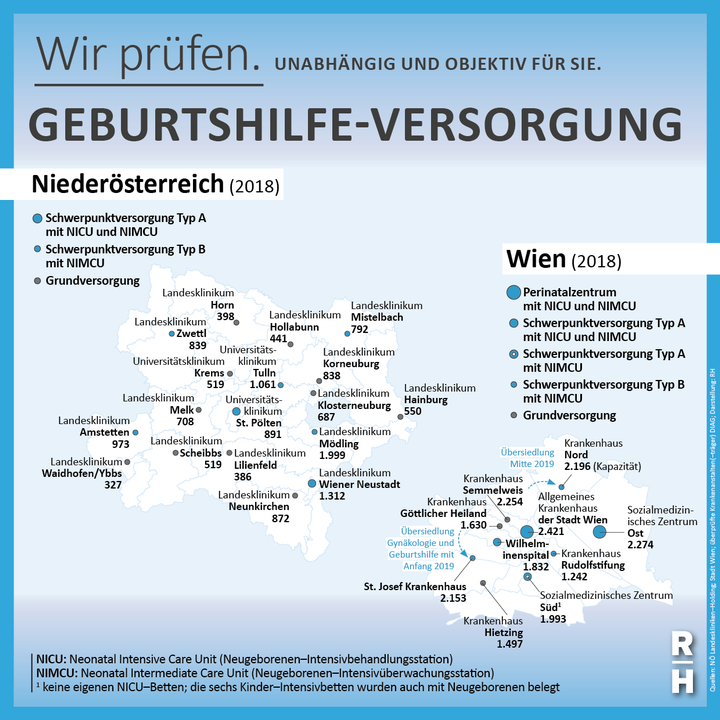Vienna and Lower Austria should ensure the availability of the necessary number of intensive care beds for newborns

In its report published today on "Obstetric Care in Lower Austria and Vienna", the Austrian Court of Audit (ACA) reveals shortages in the provision of intensive care services for newborns. The shortages resulted from insufficient hospital bed capacities as well as from the lack of medical professionals. Also as regards the transport of newborns to a neonatology unit – i.e. a hospital unit specialized in newborn medicine – specially trained accompanying medical staff was partly lacking.
For this audit, the ACA took into account suggestions of citizens submitted in the framework of the ACA's citizen engagement initiative 2017. The audited period essentially spanned the years from 2015 through 2018. The audit aimed at presenting and comparing the provision of obstetric care services in Vienna and Lower Austria. In addition to the city of Vienna and the province of Lower Austria, four hospitals were subject to the audit.
Neonatology units are at up to over 90 per cent capacity
According to the audited hospitals and/or hospital operators, neonatology units experienced shortages again and again. The ACA noted that the capacity utilization, the length of stays and the scope of services differed in the neonatology units of Lower Austria and Vienna and that the overall capacity utilization was at up to over 90 per cent.
A distinction is made between neonatal intensive care unit beds (NICU beds) and neonatal intermediate care unit beds (NIMCU beds). In Lower Austria, seven of 18 obstetric units had intensive care unit and/or intermediate care unit beds in 2018. In Vienna, six of nine funded obstetric units were equipped with such beds. The overall capacity utilization in Vienna was higher than in Lower Austria.
Distribution of cross-regional patients
In 2018, seven per cent of about 17,300 women giving birth in so-called fund hospitals in Vienna were from Lower Austria. Conversely, nine per cent of about 14,100 women giving birth in Lower Austria were from Vienna. While the Viennese women chose largely Lower Austrian hospitals, which provide only primary care, the cross-regional patients from Lower Austria gave birth particularly in Viennese perinatal centres. Such centres had both NICU and NIMCU beds. In 2018, for example, eleven per cent of the women who gave birth in the Vienna General Hospital (AKH Wien) were resident in Lower Austria.
Ensuring the necessary number of hospital beds
The ACA recommends: the province of Lower Austria, the city of Vienna and the hospital operators should ensure, jointly with the two health funds and in consideration of the provisions of the Austrian Health Care Structure Plan (Österreichischer Strukturplan Gesundheit), the necessary number and location of beds required for a high-quality and safe provision of neonatal care.
Insufficient qualified staff
Shortages in intensive care for newborns also resulted from the lack of staff-related resources – both as regards doctors and care staff. Specialized training is required to address this problem. In Vienna, for example, intensive care beds for newborns had to be temporarily blocked due to a lack of staff in 2018. The ACA recommends to the Federal Ministry of Health, the province of Lower Austria and the city of Vienna to support the hospital operators’ efforts to ensure the availability of sufficient neonatal medical staff.
Problems concerning the referral of newborns
If there is no opportunity to provide adequate care to newborns, they will have to be referred. This is often done under acute and medically urgent circumstances. For the (intensive) transport of newborns, suitable means of transport and adequately trained staff are needed. Both audited provinces experienced shortages with regard to accompanying medical staff.
Lack of midwives
The ACA also points to a shortage of staff as regards midwives. According to the information provided by the Vienna hospitals, it was difficult to fill vacancies for midwives. In end-2018, for example, about twelve posts were vacant. With 26 midwives per 1,000 live births, Austria remains below the OECD average. The latter is at 35 midwives per 1,000 live births.
Deficits in prenatal diagnostics
The ACA’s audit also covered prenatal examination services carried out in obstetric outpatient clinics. In this regard, the ACA encountered marked differences in the services provided. The ACA points to the fact that the failure to carry out or to recommend examinations can result in claims for damages. So can examinations that were carried out unduly.
The Federal Ministry of Health, the province of Lower Austria and the city of Vienna should take measures jointly with the umbrella association of social insurance institutions in order to ensure adequate care for pregnant women in the area of prenatal diagnostics that is in accordance with the latest scientific knowledge.
- pdf Datei:
- 5,703.4 KB
- Umfang:
- 144 Seiten
Report: Obstetric Care in Lower Austria and Vienna (in German)
From February to June 2019, the ACA audited the obstetric care services in Lower Austria and Vienna, especially at the four hospitals Landesklinikum Korneuburg, Universitätsklinikum St. Pölten, St. Josef Krankenhaus and the Sozialmedizinisches Zentrum Ost – Donauspital.


